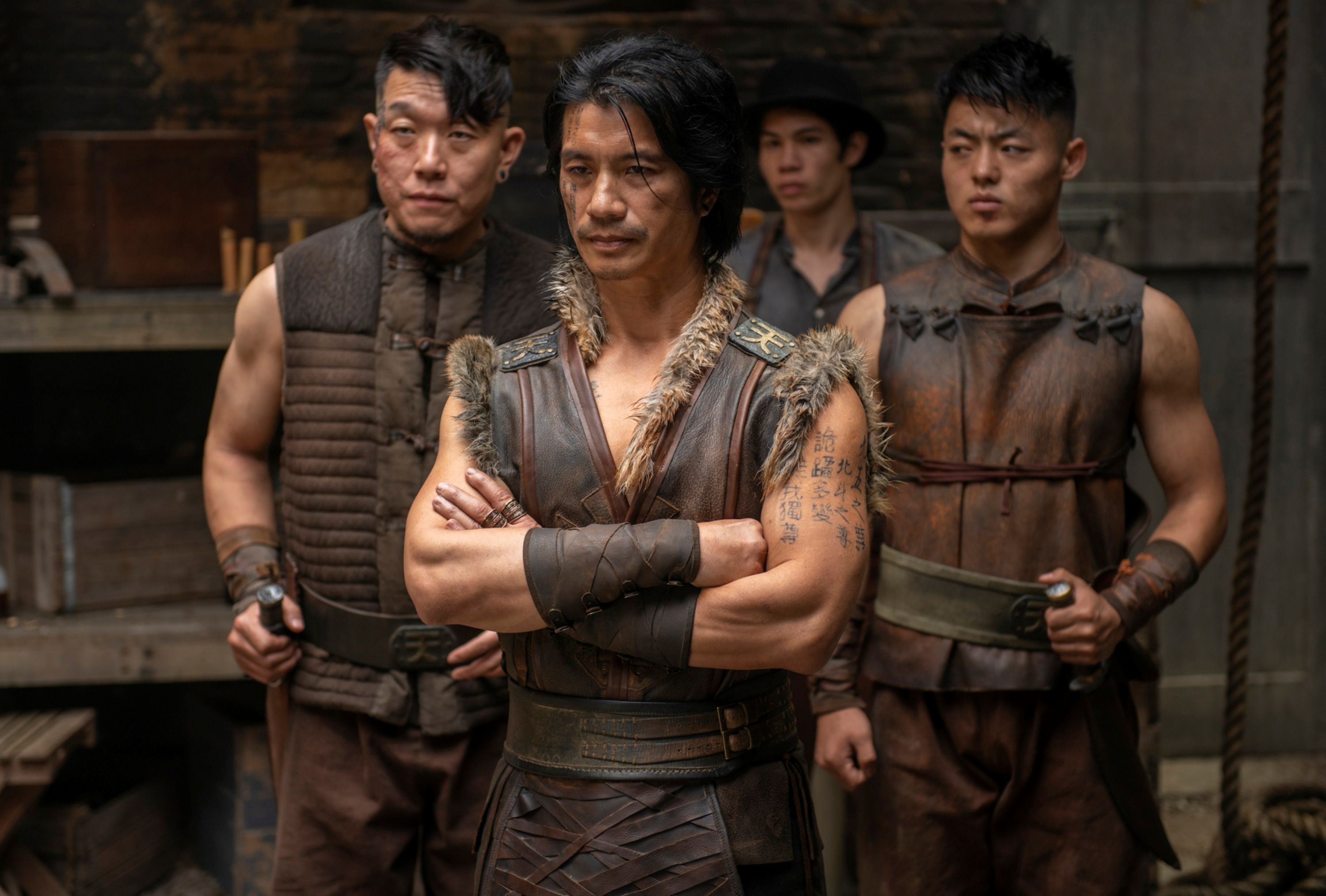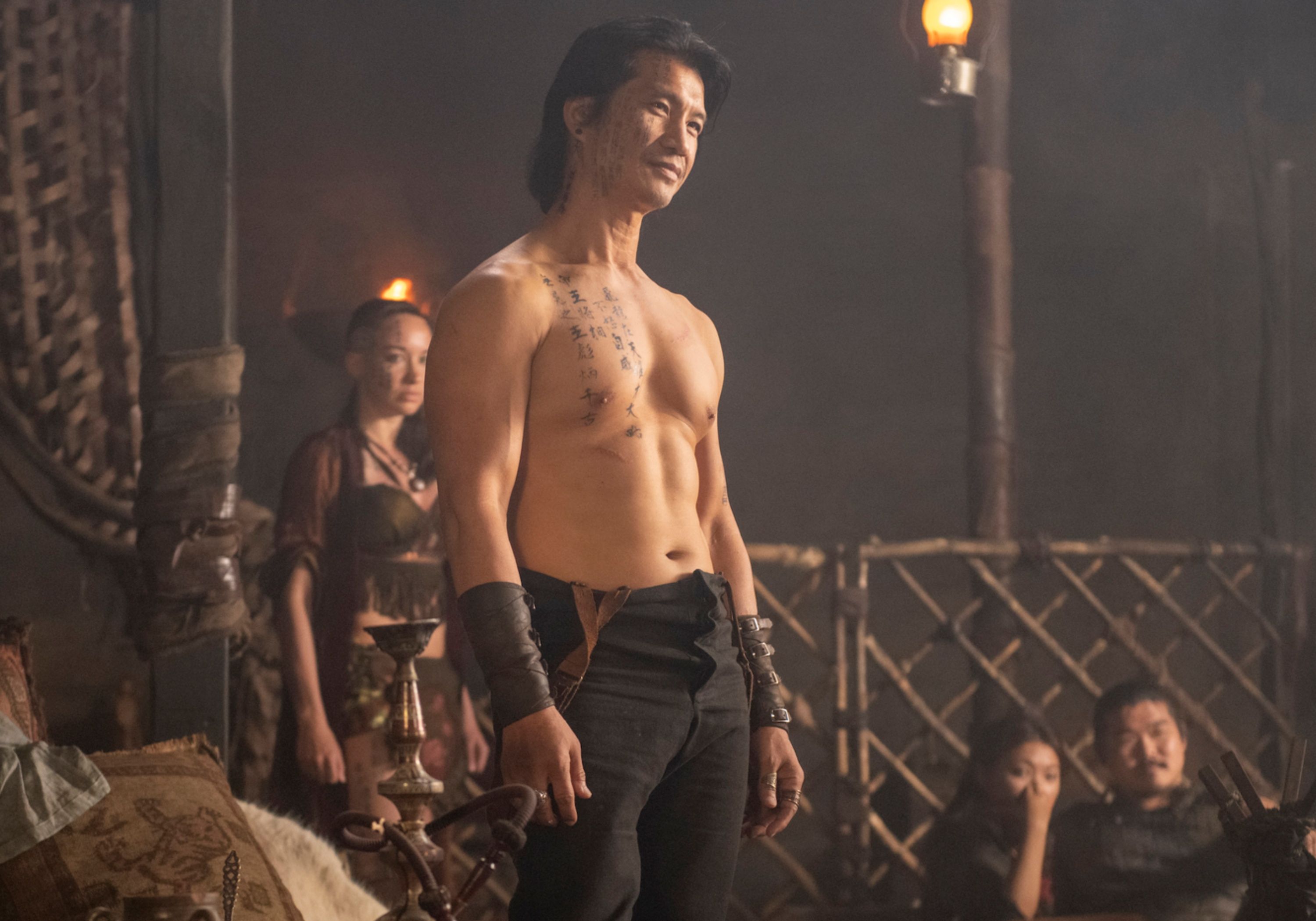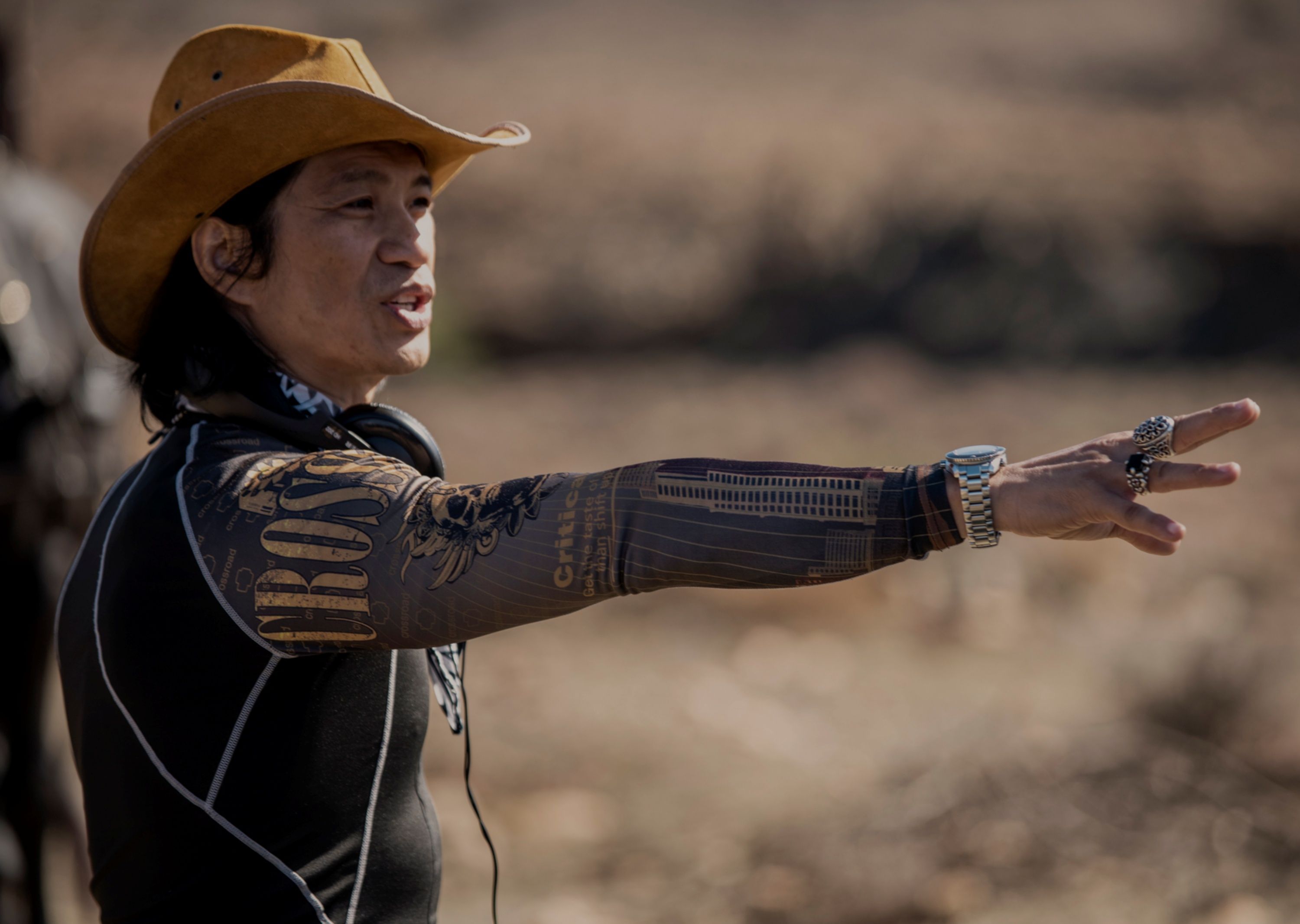If you’re into badass action, complex characters, and a fascinating world of heroes and criminals that often blur the lines between each, then you should definitely check out the series Warrior, now streaming on HBO Max. From showrunner Jonathan Tropper and executive producers Shannon Lee (the daughter of Bruce Lee, who wrote the original treatment that inspired the series) and Justin Lin, the story is set during the Tong Wars of San Francisco’s Chinatown in the late 19th century and follows martial arts prodigy Ah Sahm (Andrew Koji), who emigrated from China and is trying to find his place in a new country while making a name for himself and learning that the ties of family, both blood and chosen, will always be pushed to the limits.
During this 1-on-1 phone interview with Collider, actor Dustin Nguyen (who plays Zing, the unpredictable leader of the Fung Hai Tong) talked about the fun of getting to play a villain, how the skeletons in his character’s closet affects his actions, the evolution of Zing, his experience directing an episode in the second season, and why it would be bittersweet to have the series end with Season 2. He also talked about what it’s like to be so identified with the original 21 Jump Street and the impact that hit series had on his life.
Collider: With a character like this, is it fun to be the one who’s causing trouble for pretty much everybody?
DUSTIN NGUYEN: I don’t get a lot of opportunities to play an antagonist or a villain, if you want to use that word, but I think they’re just great characters to play. With somebody like Zing, I just get to have so much fun. He doesn’t have a lot of angst. You haven’t seen it, anyway. He’s just one of those characters who causes people a lot of misery, and yet there’s a motive behind it. Visually, it’s also a fun character. They make me look pretty menacing. It’s a lot of fun. I always enjoy playing villains.
This is such an interesting character because he’s somebody where I often wonder what he’s up to when we’re not seeing him. If we could check in with him, just on the day to day, what do you think we’d see him doing when he’s on his own?
NGUYEN: I think about that sometimes, too. I think it would be very different from all of the other characters. Whenever you have a person that’s colorful and has this “I don’t care about anything” attitude, inevitably there’s something inside that’s thrilling, particularly for the era and the history behind these characters coming to America and trying to get a foothold in society and in the world. When somebody is as power-hungry as Zing, undoubtedly there are some skeletons in his closet. That’s something that eventually I would like to see explored because it’s interesting. You think somebody like that is a certain way on the outside, but sometimes behind the scenes in his off-hours, it could be a whole different story. I don’t think his mind would ever stop.
All of this is just conjecture and off-screen, but with somebody like him, who is plotting to take over the heroin business and eliminate Dianne [Doan]’s character and the other Tongs, and possibly even have some kind of influence on the San Francisco police department, I don’t think he ever stops thinking. He’s an underdog because no one really takes him seriously, including Dianne’s character, thinking this is a guy that’s just going to be muscle, with wildness and the savagery. He’s one of those guys where, if you underestimate him, it could get you into a lot of trouble.
When you signed on to do this series, what were you told about Zing and who he would be? Did you know that he would evolve in the way that he has, or has that developed as you’ve worked on the character?
NGUYEN: I like to think that it was thought out already by Jonathan [Tropper] and the writers. When I was approached to do this, they didn’t tell me a lot of details. I came in quite late in the first season. When Justin Lin approached me with this show and this character, in particular, he did mention that there wasn’t a lot to me to do in the first season, but they wanted to set up the character of Zing to be an important antagonist in the second season. That’s all I knew, and frankly, that’s all I needed to hear because it was Justin Lin and it was a concept from Bruce Lee from 40 years ago. I was so there. I trusted that it would be done in an entertaining and interesting way. I came on immediately, just to have the opportunity to be involved in a show that I felt was potentially groundbreaking.
To what degree my character was going to progress, I didn’t give as much thought. I just wanted to be a part of the Warrior machinery and contribute somehow. Once I came on, I was told a little more about the second season and what was going to happen to my character. All of that was just a pleasure. I don’t think I ever even asked Jonathan, “Hey, what’s going to happen to my character next season?” When we ended the season, Jonathan told me that Zing was going to play a crucial part in the second season, and I just trusted him with that. I was just bugging him to let me direct.
With the way that this business is, a lot of people make a lot of promises. Is it nice to actually be on a show where they tell you the character is expanding, and then they actually follow through with that?
NGUYEN: Of course, it’s very nice. Because I’ve done this for a long time and just in life, I’ve learned to live with very little expectation. Then, you’re not let down. The more you expect, the more you’re going to be let down and disappointed. When everything comes together, it’s just a nice bonus. A lot of it has to do with trust because of who these people are. There’s an integrity behind it that I feel is genuine. I trust my own instincts. I saw the passion and the commitment they put into making sure that show is as good as it could be, in a respectful way, to Bruce Lee and the legacy that he left behind.
What was it like to direct an episode of this show?
NGUYEN: It was wonderful. I had the time of my life. I’ve been directing films in Vietnam and feature films, so the experience was a little different, but I kinda know what I’m doing. TV is a different animal. You’re walking into a show that is already established and there are certain parameters, creatively as well as logistically that you’ve gotta work within, while at the same time trying to bring something interesting to it to service the story that’s been going on.
On the one hand, it’s a lot of pressure because they’re trusting you. In this case, I think it was the second most expensive episode of the season, due to the sets that had to be built and the completely different world. For me, walking into it, I had the advantage of being on the show already, and the cast is basically family, so they trusted me with it. And everybody from the DP to the production designer and all of these people were such cheerleaders for m to do this. They were so excited that I got to direct the show and they were very excited to work with me. You couldn’t ask for a better support system, and that fueled me to do a great job. I would do a great job anyway because I love being on a movie set, but to have that behind you, I had the time of my life. I was so excited because I’m a huge devotee to the spaghetti Western genre, and there was an opportunity to do that visually with Episode 6, as well as it being somewhat of an homage to Bruce Lee’s Enter the Dragon, with the tournament and everything. It was just the best of all worlds.
Directors always talk about not having enough time or money, but with the bigger budget, how did that feel?
NGUYEN: First of all, it needs to be said the budget was not there. Every single episode that we do for Warrior, there’s never enough money. I don’t think the producers mind me saying this, and I say this in a positive way, but I feel the product we produce from the budget is amazing. We get so much bang for our buck. I’ve done movies in Vietnam and I know what it’s like behind the scenes, and compared to what I’ve done in Asia, the budget was a very good budget. But what the show requires and demands, we don’t have that much money compared to other TV shows out there. And with the second season, we didn’t necessarily have more money. The budget wasn’t there. It’s always a race against time. That’s part of the game, and everybody knows that. The nice thing is that we have people who can take less and make more out of it. I’m not patting ourselves on the back, but in a way I am because you asked the question. You’re forced to be more prepared. For me, as a director, I had to be a lot more prepared, and then you learn to solve problems.
We had issues in pre-production with the budget for Episode 6, which was bigger than we thought, due to the nature of the episode. What was seemingly a very contained, one location episode was actually logistically much more expensive to do because the exteriors had to look Western. We had to build brand new sets, rather than use the existing Chinatown sets. A completely different set of costumes had to be brought in from London. It was a big challenge. And then, we had to try to figure out how to do it, with the constraint of the shooting schedule. It was a big learning curve. At some point, we had to consider doing it green screen. Of course, I felt that we would do ourselves a disservice if we did green screen. We’ll never know for sure, but I truly feel that the real locations really added a lot to the episode and gave the actors a lot to really immerse themselves in. It was a real joy. Most of the regular cast had already wrapped for the season, but I had Jason [Tobin], Andrew [Koji] and Chen [Tang], and the guest stars. It was one big family and I put them to work sometimes. When I wanted to move furniture around and move props, whoever was sitting there rehearsing would have to give me a hand with it. We enjoyed doing all of that. We enjoyed doing whatever it took to get the job done.
I first became aware of you with 21 Jump Street. At the time that you did that series, could you ever have imagined that it would still be something that you would be identified with, all of these years later?
NGUYEN: Not at all, and I think I can speak for all of us from 21 Jump Street. I remember getting the job, and we were all new actors just starting out and we were over the moon to have a job. At the time, Fox wasn’t even a legitimate network. So, no, we never saw it coming. We thought we just landed this cool little show. We knew, going in, that we were going to do 13 episodes, and we thought that was going to be it. We never thought the show would become the success that it did, culturally. To this day, I’m still amazed. I go to places in the worldwide, like in Cape Town where we [shot Warrior], and it’s been more than 30 years, and people there recognized me from 21 Jump Street, which blows my mind. I had this wonderful driver, who drove me to and from the set every day, who told me about how he used to watch 21 Jump Street. It’s pretty surreal.
The flip side is that realize that you’re really old and you’ve been around a long time. My first day on set, Joe Taslim walked up to me with this reverence, and he greeted me and said he grew up watching the show and watching me and how, when he saw me, he realized it was possible for him to be an actor. I thought he was pulling my leg. It was just an outpouring of sentiment. He was really serious, and I was really taken aback by it.
When you started out as an actor, what was your goal? What did success feel like to you then, and how do you think that version of you would feel about the career that you’ve had?
NGUYEN: I never set out to be an actor. I always knew that I wanted to direct and produce movies. I’m well aware that I was very lucky. My career started out with a bang and I’ve had incredible opportunities to do very good projects and work with wonderful people. I would be lying to say that I wasn’t aware of the success and the fame that it brought me and the cast members of 21 Jump Street. At the height of the show, we literally couldn’t go anywhere. We all enjoyed that, but I had enough sense to know that all of that would be gone, at some point. Nothing lasts forever. So, I continued to keep working in any way that I could, but I never really thought of the trajectory of what kind of career I was going to have, and certainly not where I ended up today.
One thing that I was aware of was that, whatever I do, as an Asian American actor, I should try my best to bring something positive to the image of an Asian American. Whenever I can, I try to avoid roles or material that I felt I couldn’t do anything positive with. That has always been my agenda. I hope that the work speaks for itself because I also don’t want to politicize it. But I never really had a vision of where my career would be. I knew that eventually, I would direct. It was just a question of when, where and what. Now, looking back, I’m astounded that I’m still around. It’s really nice to be back on American television. I’ve been living in Vietnam for the last 10 years, and working and living over there, so it feels nice to be back with a show that I’m quite proud of.
If Season 2 is the end of Warrior, what has it meant to you to be a part of this series, to have a hand in bringing the visibility to the screen, and in helping teach an audience that there’s so much more to the world and the history of the world than they were even aware of?
NGUYEN: You always want to be positive, but I’d be lying if I didn’t say that it would be bittersweet to end with Season 2. We knew that it was a very special season, and that it’s a special show in general, so it’s bittersweet that the future of the show is uncertain. However, you look at something like this and you ask yourself, “Did we give it everything that we could?” If the answer is yes – and in my case and everyone else’s case, it’s a resounding yes – you hope the show, besides entertaining people, inspires them to reflect about the human condition and certainly what’s going on in the world today.
When we wrapped up the season, especially when I wrapped Episode 6, which was the very last one we shot in the season, it was a very small group of actors and it was very sad because we weren’t sure if we were going to see each other for another season. There’s no official announcement of any kind. We’re very happy with what we’ve done — would we love to see the show continue? Of course. There’s so much more to the show that could be mined, thematically and with every character.
Warrior is available to stream at HBO Max.



